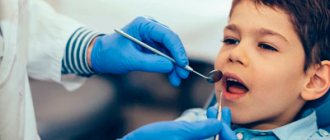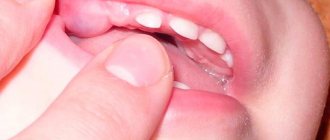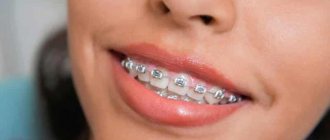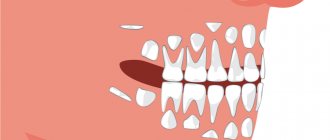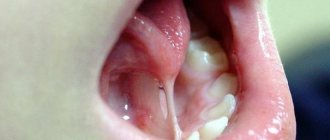Have you already met the tooth fairy, who brings you a coin for a lost baby tooth? Sleepless nights are over, your baby pleases you with twenty temporary teeth and you are starting to think about when to expect permanent ones? Let's try to figure it out when baby teeth fall out
, what you need to remember and what to pay attention to when your child changes
baby teeth
to permanent ones.
How it all happens
First of all, a little anatomy. Baby teeth are formed in the prenatal period, but the formation of permanent teeth begins after the baby is born. Thus, when you rejoice at the first tooth that has erupted, its replacement is already waiting in the wings. The time and order of eruption of permanent teeth, as well as milk teeth, is individual for each child. But temporary teeth fall out in approximately the same order as they appeared. The permanent first molars appear first. There is no milk analogue for these teeth, because in a small child’s jaw there was simply not enough space for them. The baby grows, the gaps in the dentition increase and the first adult teeth appear in the mouth - the so-called “sixes”. After the molars have erupted, it is time to replace the baby teeth with permanent ones. Loss occurs, as a rule, in the same order as appearance.
The procedure and timing of changing baby teeth to permanent ones
When does it make sense to wait for the first permanent teeth to appear? As we said above, the first molars to erupt are the teeth that are not included in the primary set. This happens around the age of six. The next ones to wait for are the front teeth, which displace the milk teeth. Tooth loss in children
It begins with the temporary root gradually resolving, making room for the permanent tooth. The baby tooth becomes loose, falls out, and very soon your child will be able to boast a real, adult set of teeth.
Tooth loss chart
Here is an approximate order of loss of temporary teeth, which is preceded by the resorption of their roots:
- the roots of the upper and lower central incisors begin to decrease from 4-5 years. As a rule, this process lasts about two years and they fall out by the age of 6-7 years;
- the upper and lower lateral incisors become loose from the age of six and their permanent analogues should be expected at the age of 7-8 years;
- The first molars above and below can be prepared for replacement within three years. The process of root resorption begins at the age of 7 and permanent ones appear by the age of 9-11;
- next in line are the upper and lower canines. The root dissolves starting at the age of eight and children show off new fangs by the age of 9-12;
- The second molars complete the process of tooth replacement. Baby teeth will fall out around the tenth year of life.
How many baby teeth do children lose?
The very first teeth appear between the ages of six months and one year. First, the incisors appear, located below and in the center, then the upper ones, and only then the lower lateral and upper lateral ones. This is followed by the first molars, canines and second molars. In pediatric practice, such a concept as a dental formula is used, that is, a standard dental set for children: 2 incisors, 2 molars and a canine. Multiplying the data obtained by four, we get 20 – the number of baby teeth is normal. Accordingly, the same number of baby teeth fall out.
Dental clinic "32 Dent" offers a full range of services in the field of pediatric dentistry. To receive complete and detailed answers to all your questions, call the numbers listed on the website.
Timing of permanent teeth eruption
Permanent teeth in children erupt in the same order as baby teeth:
- central incisors above and below: permanent teeth appear in first-graders - at 6-7 years from below and at 7-8 years from above;
- the lateral incisors on both jaws change to permanent ones at 7-9 years of age;
- permanent first premolars appear by 6-11 years, and second ones should be expected no earlier than 10-12 years;
- at the age of nine to twelve, the upper and lower canines appear;
- The appearance of molars usually begins at the age of six and ends at the age of 21, when the third molars erupt.
Please note: the information above is approximate, and if your baby's teeth are not appearing on schedule, there is no reason to worry. In some children, permanent dentition forms earlier, in others - later. In any case, by the time they reach adulthood, most teenagers can already boast a full set of permanent teeth, and all that remains is to wait for the “eights” - wisdom teeth. However, more and more often, recently, wisdom teeth do not appear at all, as they are rudimentary and practically do not participate in the chewing process.
Early tooth loss
The time of tooth loss depends on the individual characteristics of the child’s body. However, premature tooth loss can be dangerous. The thing is that if a baby tooth is missing for a long time, then the neighboring teeth move, and there is simply no room left for the permanent one, which begins to grow in due course. This situation can cause a violation of the correct bite, distort the dentition and require long-term treatment by an orthodontist.
What causes premature tooth loss in children:
- various injuries;
- periodontal diseases;
- caries;
- infectious diseases suffered by a child in preschool age.
If a baby tooth has fallen out, and its permanent replacement is not expected soon, consult a dentist. In modern dentistry, there are special designs - plates that do not allow neighboring teeth to move and preserve space for a permanent tooth. Such systems do not injure tooth enamel, do not involve grinding of teeth and do not interfere with the baby while talking and eating.
Caring for a kitten during the period of teeth change
The period of changing teeth can really become a test for an inexperienced owner. However, it is necessary to understand that the animal is not sick, does not need to take medications and constant visits from veterinarians. Most often, for a cat, everything happens, if not unnoticed, then at least painlessly.
There is no need to allow the kitten to chew furniture, spoil things, and especially not to bite and scratch you. In the future, this habit could become a really serious problem. Changing teeth is a natural process for an animal; therefore, the initially established rules of behavior must be preserved.
However, the task of every responsible owner is to make this period easier for the animal, take care of proper nutrition, brushing teeth and the availability of special toys.
Special food
A kitten needs proper and complete nutrition . However, despite the abundance of food created specifically for the period of teeth change, the animal may react negatively to a sudden change in food. Therefore, you need to ensure that your pet has the necessary vitamins and supplements in its diet, thanks to which permanent teeth will grow strong.
There are nutritional principles that must be followed when a kitten’s teeth change:
- First of all, you need to avoid overly soft food: kittens can swallow lost teeth along with soft food, which can lead to damage to the esophagus. The food should be large and slightly rough. Regular dry food for kittens is ideal.
Dry food is the best option during teeth change
- Large pieces of meat (beef, turkey, chicken, rabbit) scalded or boiled, cut into small pieces, are also ideal for a kitten.
- You need to include cottage cheese and other fermented milk products that are rich in calcium in your diet.
- The kitten needs calcium and phosphorus; they can be given as supplements to the main diet. At the pet store you can find both drops and small tablets that can be added to food. Such supplements also contain a little analgesic so that the kitten does not experience severe pain.
- A maximum of twice a week, you can give your kitten low-fat boiled sea fish, for example, hake. However, you should not overuse fish, even though it is rich in phosphorus.
- Meat or fish should be given mixed with cereals: oatmeal, buckwheat or rice. It is also useful to add some vegetables, such as carrots, zucchini or pumpkin, both raw and boiled.
- The diet should also include sufficient amounts of vitamins A and D.
- The kitten will try to chew everything, including your things, so it’s worth purchasing special bones. They contain the necessary vitamin supplements, and in fact the kitten gets the opportunity not only to strengthen its teeth, but also the necessary amount of vitamins supplied with saliva.
Bones are an important part of the diet and serve to prevent the kitten from chewing your things.
Veterinarians advise not to mix natural food (meat, fish, vegetables, etc.) and dry food. If you switched your kitten to dry food at an early age, then you should stick to it. The fact is that these types of food are digested differently, and when mixed, the kitten may experience bloating or even colic.
When choosing a feeding method, you should consult a veterinarian: each pet is individual, many may not be suitable for dry or natural food
Vaccination during the period of teeth change
Very often, owners are faced with an important question: is it possible to get vaccinations or other vaccinations while changing teeth? Veterinarians speak out unequivocally - changing teeth is already a serious burden for a kitten. Against the backdrop of fever and pain, getting vaccinated can be dangerous. This not only adversely affects the kitten’s immune system, but also leads to stunted growth of the animal.
Vaccination during the period of teeth change is not recommended.
It is important to follow the vaccination schedule for your pets as prescribed by your doctor. The vaccination schedule is set individually, taking into account the age characteristics of the body and physiological state.
My kitten was scheduled for the first vaccination very late. This was due to the fact that he was found on the street and many tests had to be done to assess his health. The time for his vaccination was due to change his teeth, so it had to be postponed for a while (until the temperature passed and slight inflammation of the gums subsided).
Teeth cleaning
Many owners ignore brushing their teeth. However, constant oral care will help keep your animal's teeth strong. It is necessary to accustom your cat to brushing its teeth from the early months of life so that in the future it will adequately perceive this procedure. If the cat refuses to accept traditional brushing with a toothbrush or powder, pet stores sell special gels for disinfecting the oral cavity. You can combine them with special foods and vitamins that include coarse fibers. It is recommended to brush your teeth once every three to four weeks.
Brushing your teeth is an important procedure that your kitten needs to be accustomed to.
During the change of teeth, kittens' gums can become inflamed, so you need to purchase a gel that also contains an anesthetic and anti-inflammatory, which can greatly alleviate your pet's condition.
Delay in loss of primary teeth
Your child is finishing school, but some of his baby teeth have not yet been replaced by permanent ones? It is worth making an appointment at a dental clinic. Temporary teeth that remain in their places for too long are a sign that there are disturbances in the functioning of the child’s body.
Late tooth loss can be caused by:
- abnormal location of the permanent tooth germ;
- regular stress;
- malnutrition and lack of vitamins and microelements;
- chronic diseases.
Do you want your child to have straight and healthy permanent teeth? Do not neglect preventive examinations at the dentist twice a year.
In what cases is it necessary to contact a veterinarian?
The change of teeth occurs gradually, and it is necessary to regularly examine the kitten’s oral cavity. If the gums are pink, there is no inflammation or redness in the places where soft tissue joins the bone, and baby teeth do not interfere with the growth of permanent teeth, then there is no reason to worry. You should contact your veterinarian if you notice the following problems:
- there is redness around the baby tooth or the hole where it was located;
- pus appeared in the hole from the fallen tooth;
- a very strong unpleasant odor comes from the mouth;
- there is inflammation on the gums;
- the new tooth grows in such a way that it damages the mucous membrane, due to the fact that it is interfered with by the milk tooth or for another reason;
- The radical ones have grown, but the milk ones have not completely fallen out, and the shift time has ended.
You should also pay attention to the well-being and behavior of your pet. Warning signs:
- the kitten is apathetic, does not play;
- a plaintive meow, indicating serious discomfort and pain;
- the animal eats poorly or refuses to eat at all;
- anxiety, poor sleep.
Sometimes owners notice that the tray is empty for more than a day. This is also a cause for concern. The absence of bowel movements may be due to the fact that the kitten was trying to scratch its teeth and swallowed some object that blocked the intestinal lumen.
The owner should be aware that during the period of changing teeth, kittens' immune defenses are somewhat reduced, so changes in behavior may be due to the fact that the animal has contracted an infection. This can also happen to a kitten who lives in the house and is not outside. Owners can bring pathogenic flora into the apartment on shoes or clothes. Usually it is not dangerous for either animals or humans, however, against the background of a decrease in the immune status, the cat may get sick. Not everyone has been vaccinated by this age, and the animal does not have specific immunity to certain pathogens.
What to do if your teeth are uneven
Later or premature loss of baby teeth, individual characteristics of jaw development, trauma and many other factors lead to disruption of the position of the teeth. There is no need to worry too much if the emerging permanent teeth do not form a perfectly even row. Contact your orthodontist. Modern dental technologies make it possible to achieve a perfect smile with the help of braces or aligners. A child's jaw is still in the process of formation. Timely treatment is the key to quick and high-quality results.
Nature has provided for everything
Losing baby teeth is a natural and inevitable process that everyone goes through in childhood. Most often it begins at 5-6 years of age and passes painlessly. Sometimes the replacement of temporary teeth may begin earlier or, conversely, late. Some deviations from the usual indicators are not always considered a violation, since much depends on the health and physiological state of the child. When he begins to change his teeth, we recommend making an appointment with the dentist, as this is a very important period for the formation of your baby’s bite.
What should parents do?
Losing primary teeth is a completely natural process and most often it is not accompanied by pain or complications. Nevertheless, in order to be sure of the baby’s health, you should follow a few simple rules:
- The teeth should fall out on their own. Do not pull out a tooth that has begun to loosen - you may accidentally damage a root that has not yet completely resolved and it will remain in the gum. You can help a tooth only if it really “hangs by one thread.” It’s even better if the tooth is removed by a pediatric dentist;
- After a tooth falls out, the wound may bleed. Give your baby a sterile gauze swab and ask him to bite down firmly - the bleeding will stop in a few minutes. Try not to feed your child for a couple of hours after losing a tooth. For the same period, you should give up hot, sour and salty foods;
- When changing teeth, it is very important to visit the dentist once every six months for preventive examinations. Your doctor will assess the general condition of your teeth and give recommendations on how to care for your baby and permanent teeth;
- Even though baby teeth are temporary, their condition must be treated very carefully. The health of temporary teeth directly affects the health of permanent teeth.
With each new permanent tooth, your child becomes more mature. Attentive attention to oral hygiene and regular dental checkups can give your child one of the main decorations: a healthy and beautiful smile.
A child’s baby tooth has fallen out: what to do?
There is usually no pain after prolapse, despite bleeding. If the baby is afraid of blood, he needs to be calmed down. To stop it, you need to make a tampon from a bandage or sterile cotton wool and apply it to the gum. In a few minutes everything will pass. It is advisable not to feed or water the child for 2-3 hours. For aseptic treatment of a wound in the mouth, a solution of salt, soda, iodine is suitable, which should be used to rinse the oral cavity several times.
If you are just expecting this exciting event, try to prepare your child for it in advance. Tell him what awaits him and why this happens, come up with an interesting ritual associated, for example, with receiving a gift or sweets in exchange for a lost tooth.
